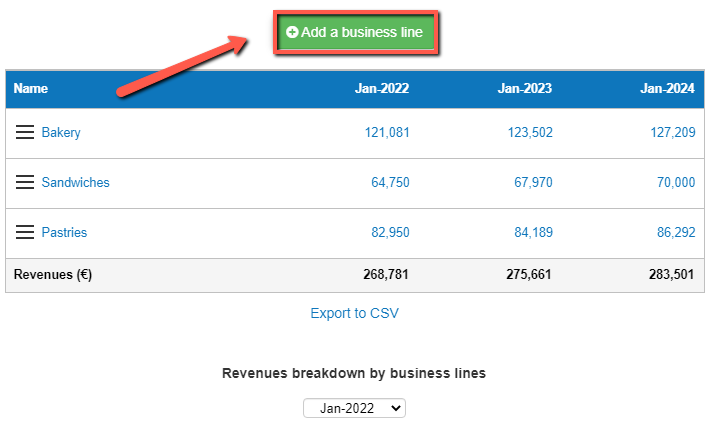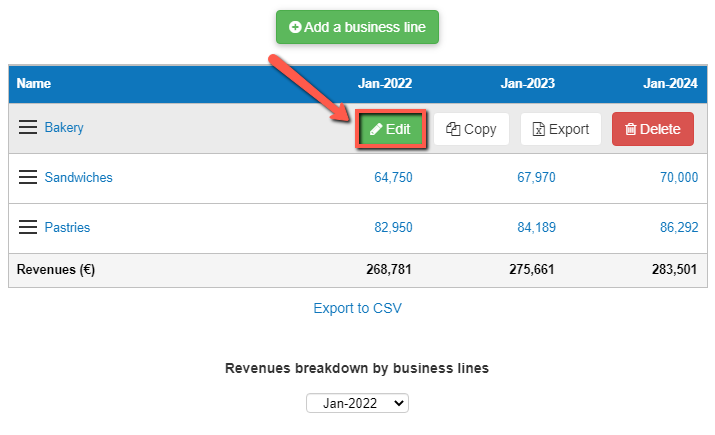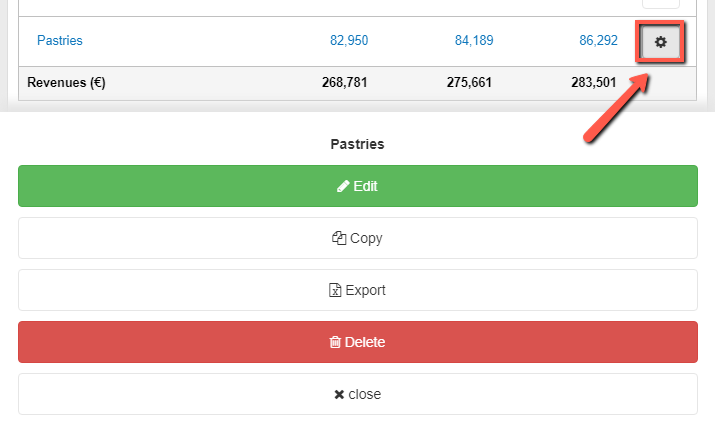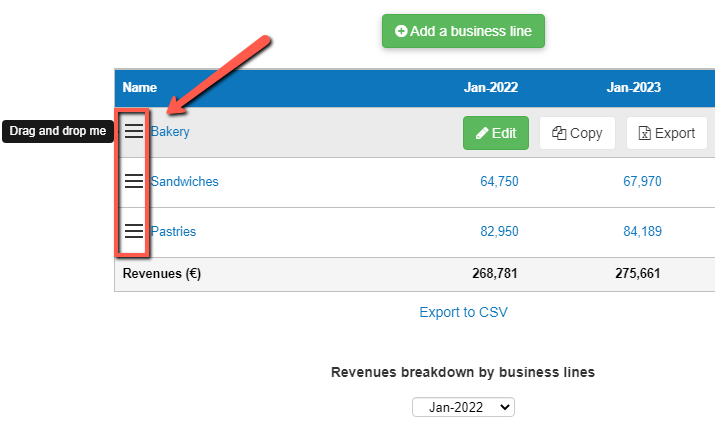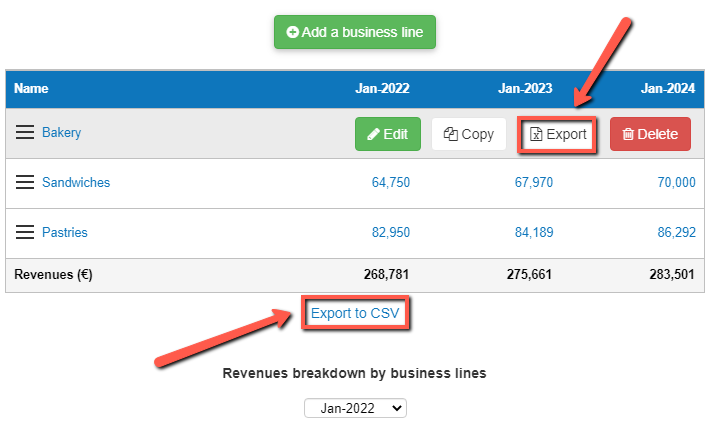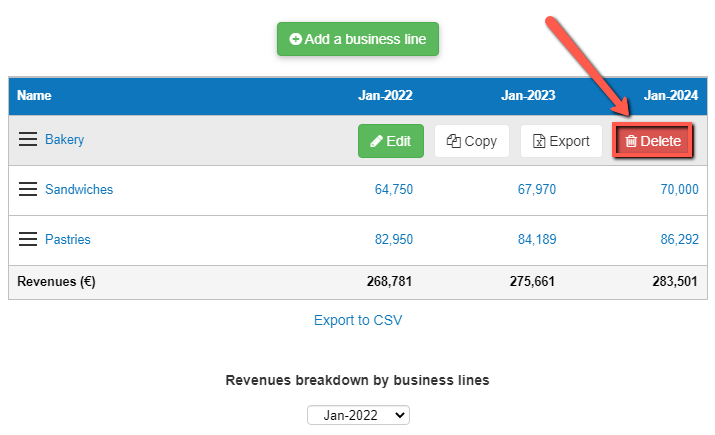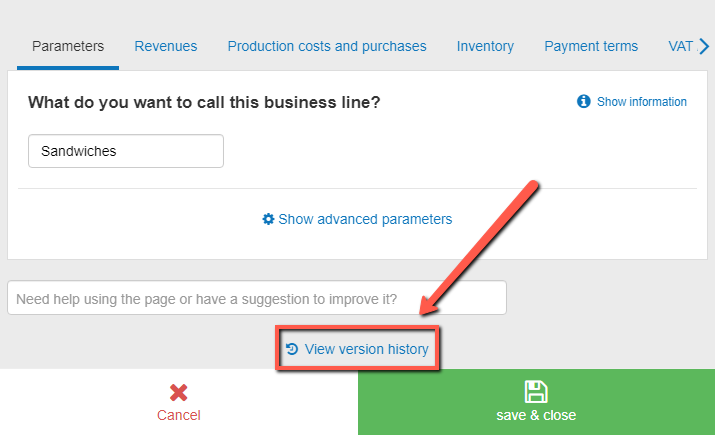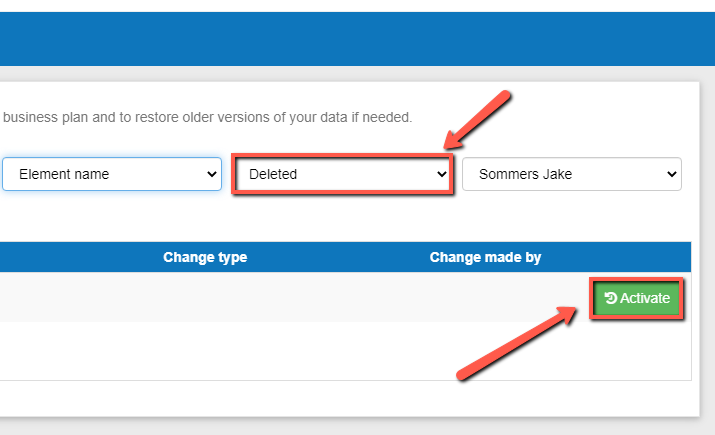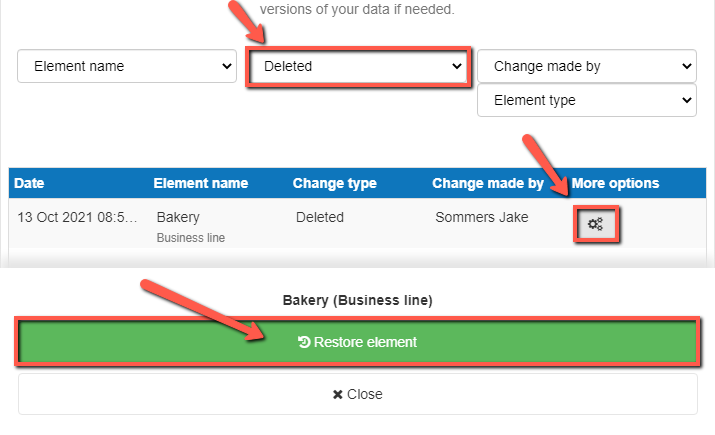How do I use the manage exceptional items module?
This article explains how you can use the manage exceptional items.
This data enables our software to build your financial statements (balance sheet, P&L, cash flow statement), which can then be downloaded along with your business plan.
It’s fast and easy to do.
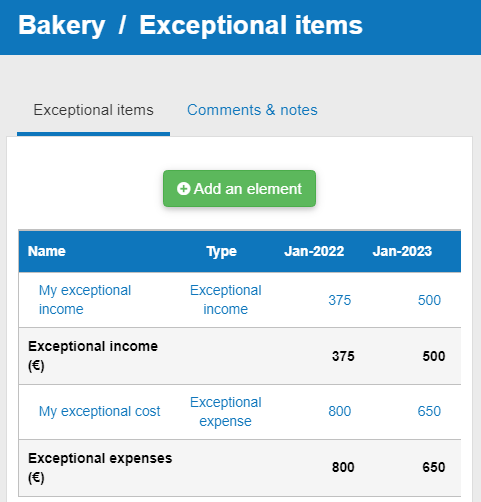
What are exceptional elements?
An exceptional item can be either a form of income or an expense for a business.
What is exceptional income?
Exceptional income is a source of income that is not linked to the company’s typical day-to-day business, thus, is unlikely to be repeated.
It is recorded separately in the company’s financial statements to prevent it being confused with regular business income.
What are exceptional expenses?
An exceptional expense is a cost incurred by a business that is not linked to the company’s typical day-to-day business, thus, is unlikely to be repeated.
It is recorded separately in the company’s financial statements to prevent it being confused with regular business expenses.
How does the exceptional elements module work?
At the centre of the module, you will find a table which details each exceptional item and their corresponding income or expenses.
You can view data for these exceptional items for up to 5 years from when you started the business plan
You can edit, copy and delete exceptional items by using the buttons in the table
You can reorganise exceptional items in the table using drag and drop
How does the exceptional elements module impact my financial forecast?
The Business Plan Shop’s software will use your exceptional items data to create your forecasted financial statements (P&L, balance sheet and cash flow statement).
These statements also form part of the financial plan section of your business plan.
As soon as you save a new exceptional item amount, the software will automatically recalculate everything to ensure that your financial forecast is up to date. It’s fast and simple, meaning that your plan will always be ready to export.
When building your forecasted financial statements for your exceptional income:
- We’ll use the amount entered to build the other exceptional income section in your P&L.
- We’ll then use your payment terms and optional VAT/GST settings to build your balance sheet (amount owed by clients and tax owed to the government)
- We’ll then combine all this data to build your cash flow forecast.
- If part of the income needs to be deferred to the next accounting period, you can use the optional deferred income revenues. In that case, we’ll also adjust the amount recognized on your P&L and balance sheet accordingly.
When building your forecasted financial statements for your exceptional expenses:
- We’ll use the amount entered to build the exceptional expenses section in your P&L.
- We will then use your payment terms and optional VAT/GST settings to build your balance sheet’s liabilities (amount owed to suppliers and tax owed to the government)
- We’ll then combine all this data to build your cash flow forecast.
- If part of the expense needs to be deferred to the next accounting period, you can use the optional deferred costs module. In that case, we’ll also adjust the amount recognized on your P&L and balance sheet accordingly.
Frequently Asked Questions
- Simply, click on the add an exceptional item button above the table
![adding a new exceptional item]()
Notes:
- In this example, we have used a screenshot from the business lines module which works in a similar way as this module
- When you click on add an exceptional item, a prompt box will appear listing the types of exceptional items that can be added.
If you are on desktop:
- Choose the row that you want to edit
- Hover your cursor over that row. An edit button will now appear.
![editing exceptional items on desktop in the business plan shop's business planning software]()
- Click on the button
- You should now be able to edit the exceptional items
If you are on mobile:
- Choose the row that you want to edit
- Click on the settings button at the end of the row. An edit button will now appear.
![editing exceptional items on mobile]()
- Click on the edit button
- You should now be able to edit the exceptional items
Notes:
- In this example, we have used a screenshot from the business lines module which works in a similar way as this module
- You can also click on the name of the exceptional item to edit it for both desktop and mobile.
Notes:
- You can re-order exceptional items by dragging and dropping them inside the table
- In this example, we have used a screenshot from the business lines module which works in a similar way as this module
If you are on desktop:
- Click on the drag handle at the beginning of the row
![reordering exceptional items by dragging and dropping them]()
- Click and hold on the icon simultaneously, while dragging it to your chosen location .
- The exceptional items should now be placed in your desired position
If you are on desktop:
- Choose the row that you want to export
- Hover your cursor over that row. An export button will now appear.
![exporting either a single exceptional item or the entire table of exceptional items on desktop]()
- Click on the export button
- The file will automatically download as a CSV
- You can either view the downloaded file or save it
If you are on mobile:
- Choose the row that you want to export
- Click on the more options icon at the end of the row. An export button will now appear.
![exporting a single exceptional item on mobile]()
- Click on the export button
- The file will automatically download as a CSV
- You can either view the downloaded file or save it
Notes:
- In this example, we have used the business lines module
- If you are on desktop, you can also click on the "export to CSV" button beneath the table. This exports the entire table, rather than a single exceptional item. In this case, you'll also be given the choice to export either monthly or yearly data.
If you are on desktop:
- Choose the row that you want to delete from the table
- Hover your cursor over that row. A delete button will now appear.
![removing outdated exceptional items on desktop]()
- Click on the delete button
- That row will now be deleted from the table
If you are on mobile:
- Choose the row that you want to delete from the table
- Click on the more options icon at the end of the row. A delete button will now appear.
![removing outdated exceptional items on mobile]()
- Click on the delete button
- That row will now be deleted from the table
Notes:
- In this example, we have used a screenshot from the business lines module which works in a similar way as this module
- Click on the name of any exceptional items
- For other ways to edit an exceptional items, check out our FAQ above
- You'll now be taken to the edit view page
- Scroll down and click on view version history, just beneath the table
![viewing previous versions of the exceptional item table]()
- Use the filters located above the table to find your deleted exceptional items
The final step will depend on whether your on desktop or mobile:
If you are on desktop:
- Click on the "activate" button to restore the exceptional items
![restoring accidently deleted exceptional items on desktop]()
If you are on mobile:
- Click on the "more" button at the end of the row
- Click on the "restore exceptional items" button that appears
![restoring accidently deleted exceptional items on mobile]()
- Click on the "restore exceptional items" button that appears
Notes:
- In this example, we have used a screenshot from the business lines module which works in a similar way as this module
- exceptional items can only be restored from their edit view
Go further with The Business Plan Shop
Was this page helpful?
